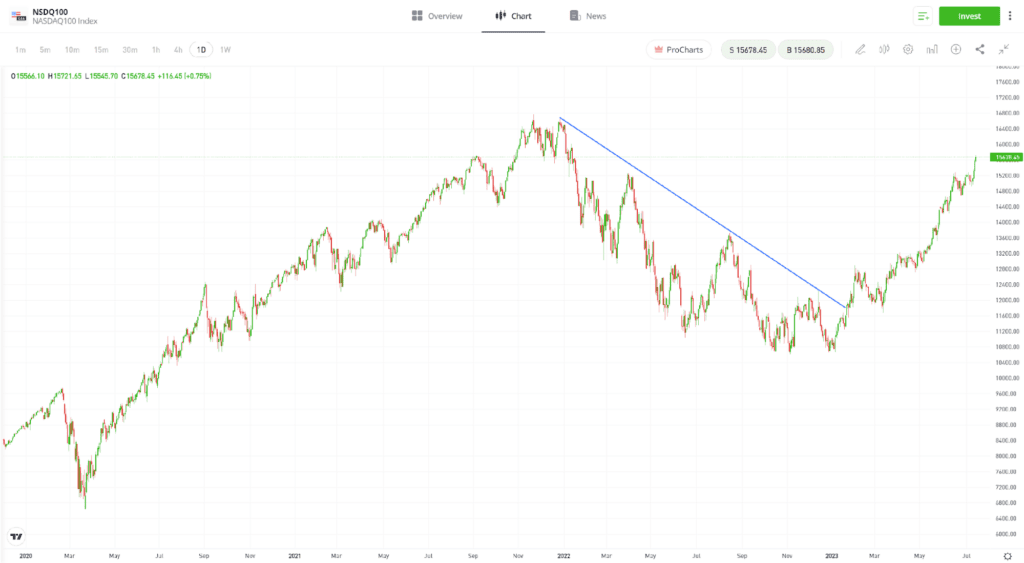Macroeconomics can influence asset prices and understanding this is crucial to your trading bottom line because it can help to provide insights into the overarching state of the economy, which can then inform you about inflation, GDP and interest rates.
Whether you are selecting individual stocks or investing in other asset classes, integrating macroeconomic factors into the decision-making process can be incredibly beneficial. “Macroeconomic factors” can refer to high-level events and trends that impact an entire economy, extending beyond just individual stocks.

Why macro drives markets
All financial
That said, macroeconomic factors, which exert influence across all sectors of the economy, also play a crucial role.
But why is macroeconomics important? Put simply, it is important because it influences aggregate levels of supply and demand, as well as the overall risk-appetite within the broader economy. This influence holds great power: a single macroeconomic event has the potential to cause the price of different assets to simultaneously rise or fall.
There are a wide range of macroeconomic factors to consider. The four most prominent macroeconomic factors are interest rates,
Tip: Investors should try to keep up to date with the high-level, economy-wide events that impact macroeconomics.
An increase in either of the first two factors is generally perceived as bad news for risk assets. Markets tend to react badly to the uncertainty associated with inflation, and central bankers often raise interest rates to increase borrowing costs if they feel a need to curb an overheating economy.
On the other hand, economic expansion and higher employment levels generally lead to more consumer spending and an increased demand for goods and services.
Tip: Investors should consider restructuring their investment portfolio, taking into account the state of the underlying economy.
How does macro impact earnings?
Macroeconomic changes, such as war or inflation, can impact earnings by causing economic turbulence. Consumer sentiment becomes fearful, resulting in the decrease of household spending and the decrease in overall income. These are particularly prevalent in cyclical companies and small businesses.

To appreciate the importance of macroeconomics and the impact it has on earnings, it is useful to look at the reverse situation, considering business earnings as the expenditures of another party.
Expenditures are influenced by macroeconomic factors, as consumers consider variables such as interest rates and GDP growth when deciding whether or not to spend money. Individuals responding to these variables by adjusting their spending habits will directly translate into higher or lower earnings for companies.
High unemployment levels across the economy or the risk of a recession can sway individual decisions as consumers consider their job security. Moreover, high inflation and interest rates can eat into family budgets, resulting in less spending.
If a country’s currency appreciates in value, imported goods and foreign vacations become comparatively more affordable. This can lead to consumers buying fewer domestically manufactured products. However, this currency shift can also result in individuals opting for vacations within their own country.
If an economy is growing, a virtuous cycle of spending can emerge. One person’s spending becomes another person’s income, which is then spent again, creating a continuous cycle.
Does macro affect valuations?
Macroeconomic factors affect stock valuations by shaping future levels of supply and demand. This is because investors and analysts use macroeconomic data to predict future risks, profitability and growth expectations.
Commonly used stock valuation models, such as the discounted future earnings model, are based on projected earnings. These models consider earnings forecasts that extend months, or even years, into the future. They use this data to calculate the present fair value of a stock.
This explains why start-up tech stocks, even in companies that have yet to become profitable, can still have sky-high valuations based on their potential for future growth.

Case study: how macroeconomic data affects future-year earnings
In 2022, analysts used macroeconomic data to downgrade their forecasts of future-year earnings, which caused the price of stocks to fall. This is shown in the example chart below of the Nasdaq 100 Index from 2021 to 2023.
| Nasdaq Price Chart 100 Index 2021-2023 |

Past performance is not an indication of future results
Source: eToro
The impact of macro on other asset classes
Changes in macroeconomic factors can impact the prices of all asset classes. The circular nature of the global economy also leads to knock-on effects, some of which can be hard to anticipate.
For example, if the price of oil goes up due to heightened geopolitical risks, stock prices may decline as companies face increased transportation costs and reduced profit margins.
Tip: The relationships between different economic factors are highly complex, often resulting in chain reactions.
Generally speaking, economic growth tends to result in an increased demand for commodities, which are essential raw materials that drive business activity. In this environment, demand for bonds may decline as the perceived level of risk is relatively low. When it comes to
Final thoughts
The importance of macroeconomics cannot be overstated. Certain announcements concerning macroeconomic factors can cause sudden price movements, while others may initiate long-term trends. Regardless of the situation, staying informed about the impact of various factors on the economy is a crucial aspect of investing.
Visit the eToro Academy to discover the impact of macroeconomics on asset prices.
Quiz
FAQs
- How can I predict the most important macroeconomic announcements?
-
An economic calendar is a readily available resource that can be used as a guide to potential macroeconomic shifts. High-quality economic calendars categorize upcoming announcements based on their level of significance.
The weighting assigned to each event is determined by the industry experts and analysts who curate and maintain the calendar.
- Are higher interest rates always bad news for stocks?
-
While increased borrowing costs can restrict consumer demand and capital investment, certain stocks can actually benefit from elevated interest rates. Banks, for instance, often experience improved profit margins when interest rates are higher.
If the interest rate hike is interpreted by stock market participants as being appropriate and decisive, prices across all sectors may remain high as investors maintain the view that the long-term prospects for equities remain unchanged.
- Can I trade macroeconomic events?
-
It is possible to trade macroeconomic events, though it will depend on the event and indicator in question. For example, the release of an inflation report might impact assets if rising prices are a widespread concern among investors.
On the other hand, an inflation report will arguably be less influential if it occurs during a period when rising prices are considered manageable. Because the timing of these reports is usually predetermined, many experienced investors will try to take advantage of the relevant macroeconomic event.
This information is for educational purposes only and should not be taken as investment advice, personal recommendation, or an offer of, or solicitation to, buy or sell any financial instruments.
This material has been prepared without regard to any particular investment objectives or financial situation and has not been prepared in accordance with the legal and regulatory requirements to promote independent research. Not all of the financial instruments and services referred to are offered by eToro and any references to past performance of a financial instrument, index, or a packaged investment product are not, and should not be taken as, a reliable indicator of future results.
eToro makes no representation and assumes no liability as to the accuracy or completeness of the content of this guide. Make sure you understand the risks involved in trading before committing any capital. Never risk more than you are prepared to lose.


